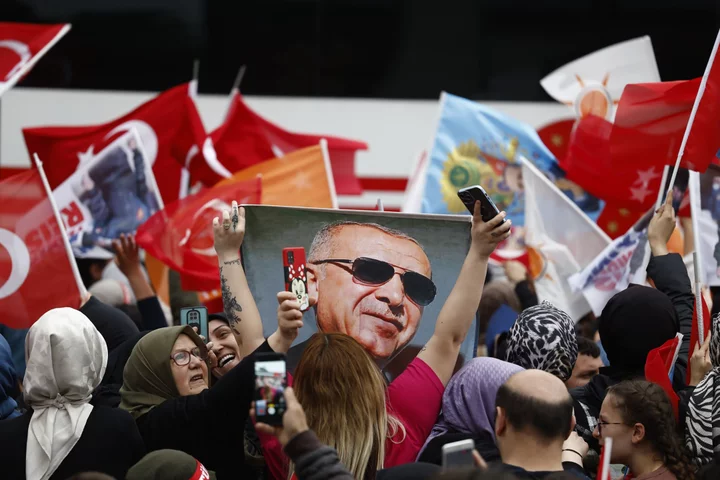Turkish President Recep Tayyip Erdogan sealed an election victory that appeared unlikely just weeks ago, raising the prospect of more friction with Western governments and international investors.
The country’s longest-serving leader prevailed 52.1% to 47.9% in a runoff vote on Sunday against opposition challenger Kemal Kilicdaroglu to take his rule well into a third decade, based on results with almost all the ballots counted. Erdogan appeared on top of a bus in Istanbul and thanked Turks for keeping him in power.
The stage was set on May 14 when Erdogan defied opinion polls to come close to winning in the first round while his alliance of parties captured a parliamentary majority. Stocks and bonds declined following that outcome, while the lira has been sinking to new depths against the dollar.
Erdogan, 69, who turned his office into the nexus of power in Turkey, has shown resilience before. Yet pollsters and financial markets had predicted a tighter election because of a cost-of-living crisis and after two devastating earthquakes. Erdogan responded by deploying the state media machine to divide the opposition alliance and mobilize his conservative grassroots.
For investors, the most pressing question now is whether he will stick to his promise of maintaining an economic policy that’s seen an exodus of foreign money. For world leaders, at stake is how Turkey maintains its delicate balancing act between NATO allies and Russia as President Vladimir Putin continues to wage war in Ukraine.
“It’s a pyrrhic victory for Erdogan,” said Nihat Ali Ozcan, a strategist at the Economic Policy Research Foundation in Ankara. “He may have extended his record rule, but his new term will be full of challenges from the economy to foreign policy.”
Rates to Rise?
Economists say a monetary policy adjustment is inevitable. While central banks worldwide have raised interest rates to try to quash inflation, Turkey’s policy makers heeded Erdogan’s calls for ultra-low borrowing costs. They cut the benchmark rate by 550 basis points since last year in the face of inflation that climbed to more than 85%.
“Vindicated by the election’s outcome, Erdogan is unlikely to embrace an outright economic orthodox approach,” said Wolfango Piccoli, co-president of Teneo Intelligence in London. Some adjustments may come, though, ahead of the March 2024 local elections, he said.
Instead, Turkey has relied on restricting banks in the foreign-exchange market and interventions in an attempt to keep the lira stable. Deposit rates now diverge sharply from the benchmark and that’s unsustainable, according to economists.
Barclays Plc’s Ercan Erguzel said that interest rates will have to rise regardless of Erdogan’s victory, albeit at a more gradual pace than if Kilicdaroglu had won. Erguzel projected that the benchmark will hit 36% by the end of this year, up from 8.5% currently.
Meanwhile, the cost of insuring against sovereign default would continue to soar, said Cagri Kutman, Turkish markets specialist at London-based KNG Securities. “Erdogan will be careful that the new economy administration has serious credibility,” said Kutman. It won’t, though, “give up on its low interest rate policy,” he said.
East and West
When it comes to foreign policy, another five years of Erdogan is likely to see Turkey assert its role as a critical buffer for migrants moving toward Europe. Erdogan will also work to maintain grain exports from the Black Sea after securing another extension two weeks ago.
The Turkish president also plans to foster peace in Ukraine while continuing to refrain from imposing sanctions on Russia because Turkey believes they are counter-productive, according to people familiar with the situation.
Erdogan would only agree to ratify Sweden’s bid to join NATO after first looking at Stockholm’s implementation of its new terrorism legislation that will go into force on June 1, the people said. However, Erdogan may need to balance his tougher approach toward Sweden to get US congressional support for Turkey’s purchase of American-made F-16 fighter jets.
In his new term, Erdogan is expected to give an increasing priority to develop Turkey’s homegrown defense industry in pursuit of a military edge to back his aspirations to make Turkey a regional power, the people said.
Author: Selcan Hacaoglu, Beril Akman and Firat Kozok

